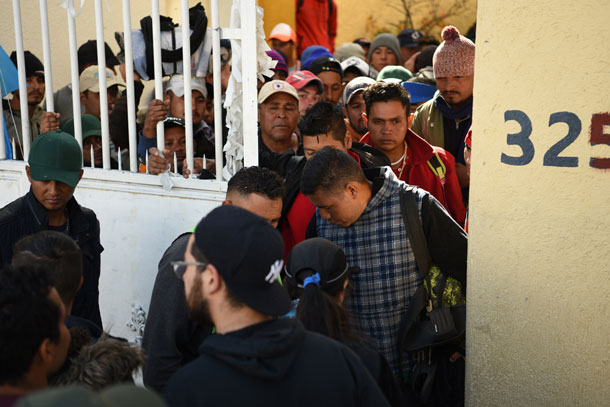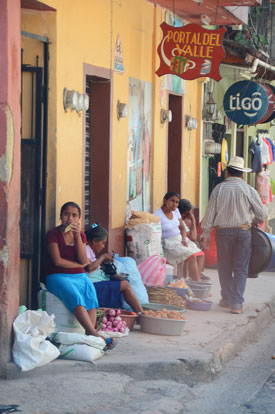Climate Migrant Caravans
Air Date: Week of January 25, 2019

Many of the Central American migrants seeking asylum have been driven to desperation by the impact of climate change, extended drought and shifting growing seasons, which have led to crop failure. (Photo: Daniel Arauz, Flickr, CC BY 2.0)
Toward the end of 2018, Central American migrant groups of several thousands of people began journeys towards the United States. Many are fleeing a massive drought that has lasted for five years. John Sutter, Senior Investigative Reporter for CNN, joins Living on Earth's Bobby Bascomb to take a look at the ties between climate change and the migrant caravans.
Transcript
Migrant caravans made headlines during the US Fall 2018 elections as groups several thousand strong from Central America trekked north towards the US, stoking xenophobic rhetoric and fears. Even now, the caravans continue, as people from Guatemala and Honduras seek sanctuary for a variety of reasons, including attempts to escape violence and poverty. And a less visible factor is climate disruption. John Sutter is a Senior Investigative Reporter for CNN who went to rural Honduras to report on climate change and immigration. He spoke with Living on Earth’s Bobby Bascomb.
BASCOMB: You went to Western Honduras near Copán for this story. First, tell me about some of the families that you spent time with there.
SUTTER: One woman I met her name was Delmi Amparo Hernandez. And she's living in a pretty small village on a mountaintop in Copán, just very near the Guatemalan border, actually. And her husband left in one of the caravans last year. Germán was his name. For the last five years, this region has just been hit with this intense drought. And you know, they’re subsistence farmers, completely reliant on maize crops. Their family was really struggling, and so when he heard about the caravan coming through, like, you know, many other people I met, he made almost a decision in that moment to go and join them. And so, you know, she was left behind with her children. And I found it just really heartbreaking that she, and some other people I met, really had almost no way of knowing what happened after that point. So he left without a phone, he left with a phone number in his pocket in case he found a way to call back, and to call a neighbor in this village and let her know how things were going. In a lot of the places I've visited, there's just this incredible, real sadness in that there are so many people and a lot of, like, working-age adults who are missing, and single parents left behind to try to fend for their families and fill in that void.

The spring rains in Central America are crucial to the growth of the corn crop, which itself is crucial to the Central American diet. For the last five years, the rains have either arrived in the wrong season, or sometimes not at all. (Photo: André Schütte, Wikimedia Commons, Public Domain)
BASCOMB: Now, tell me a bit about the drought that forced him to make that difficult decision. How long has it been going on? And in what ways is it impacting people there?
SUTTER: So this drought has lasted about five years. And in some places, it's hit harder than others. There's what's called the dry corridor of Central America, which, as that name suggests, it's normal, that the dry corridor would be dry. But some of the climate scientists I've talked to say that in the last number of years, they've started to see some things that seem unprecedented. In particular, spring rains, which are incredibly important for corn crops, which is, a staple in this region that they just haven't been coming. Like, they're almost completely missing when you look at the average rainfall by the month. So it's partly that rains have decreased, it's partly that they've shifted and are no longer falling in the seasons when they have been, you know, so useful the farmers in the past. But it's been very troubling and created a lot of hardship because it's important to realize that this lot of people in the dry corridor of Central America are subsistence farmers. They're living day to day. In other parts of the world, like the US and parts of Europe, there are crop insurance programs and other ways to tide you over in bad years of farming. There, that's, you know, not the case and often there's no irrigation system. So if it's not raining, you don't have a way to pump water in from a canal or from the groundwater to supplement your crops. They just don't grow. And so I think that's why there's been such an intense crisis there. I mean, the UN Food and Agriculture Organization says there are 2 million people in this region in the world who are at risk for hunger. It's not like they've never seen drought before, but this one has been particularly intense and troubling for farmers there.
BASCOMB: You write in your story that corn and bean crops are failing, and those are staple crops in the region. And, I know that corn is king there. I mean, people eat corn tortillas for breakfast, lunch, and dinner every day, literally. So I can imagine that if the corn crop is failing, as you mentioned, you're looking at massive malnutrition and even starvation. This is a really desperate situation.
SUTTER: Yeah, it really is. And I think that's another thing people underestimate about the caravan or any migration story, really, when you hear about it. It has to be really bad for you to want to flee a problem. There's an incredible attachment to a sense of home and place, especially among people who are farmers, and who are attached to the land. It's a big deal to think about leaving, and that gives you a hint at like, how intense the situation is, for many farmers. The experts on hunger, on starvation, people with the UN, for example, who I spoke with, they all say that this stuff is cumulative. If you have one bad year, and the rains don't fall, that creates a certain stress. If you have year, after year, after year, and at this point, essentially five years of very bad drought conditions, then that's where you start to create conditions that can lead to hunger, starvation, these truly serious problems.

Copán, Honduras, was originally a thriving tourist destination, but drought-induced crop failure has led to an economic downturn and many climate refugees have fled their land. (Photo: Alex Keshavjee, Flickr, CC BY-NC 2.0)
BASCOMB: Now, you quote the Commissioner of the US Customs and Border Protection in your article. And he says that crop failure directly translates to who is arriving at our border. But President Trump has been widely saying that immigrants in our southern border would be terrorists and drug dealers and things like that. It sounds a bit like the left-hand doesn't know what the right hand is doing.
SUTTER: Yeah, I mean, I think that that's the case with several of the agencies, right? But I was surprised that, you know, that officials were saying this is part of what's happening, and if that they had that awareness, I thought that was encouraging actually. I wish that the administration, or really anyone in Washington, would talk about this issue of migration in terms of climate change, because the projections for how many climate migrants or climate refugees there will be in the world are uncertain. And we're not preparing for that. If anything, the United States and European countries are doing the opposite, right? Like, this is a time of walls. You know, we're putting up barriers here, elsewhere in the world, trying to slow the movement of people, when we know that in just this one way, that there's going to be this macro problem of climate change that is going to push people out of their homes. And I think that's something we have to reckon with.
BASCOMB: Here on the news, we're hearing that a lot of this migration is due to gang violence and murders, you know, violent crime that's forcing people to leave their homes. But you write that the data doesn't really show that. Can you tell me about that?
SUTTER: Yes, it certainly really doesn't show that for this region, the area of Western Honduras where we spend our time and that we went to basically, because of the data that we saw. The crime rate has been going down in recent years. And we got data from the US Border Patrol that showed the sort of place of origin of people who were apprehended at the US border, and there was just this big percent increase, this spike in people coming from Western Honduras. And so I think migration stories are always complex. But I think it's not untrue, that violence is driving people out. It's not untrue, that poverty is driving people out. But it is also true that climate change and severe drought are causing people to move from that region, and from others. And I think that we have to look at that in a clear-eyed way. And think about what that means. Because the United States…we've done more than any other country to cause warming. The planet has warmed about one degree Celsius already because of people burning fossil fuels and other activities. And we're responsible for a good chunk of that. And that warming is displacing people now and is projected to displace, you know, ever-larger numbers of people moving forward. And so I think it's this really important moral question we need to ask ourselves. We're causing this hardship in parts of the world, many of us may never travel through or never see, but that stuff is real. And it's causing repercussions, one of which is that people are on the move to try to make ends meet, to try to make a livelihood, and to try to keep their lives moving. And so I think for me, it doesn't invalidate the other stories that we've heard about the caravan, but it certainly complicates them. And there's another layer to that story that I think isn't being told.

The story of Delmi Amparo Hernández and her family is an increasingly common one. In 2012, before the drought, only 3.7% of Honduran migrants came from the area surrounding Copán. These days, that percentage is over 9%. (Photo: Lynne Hertzog, Flickr, CC BY-NC 2.0)
BASCOMB: By the way, before you leave us, what happened to the family that you talked about at the beginning of our chat here? What happened with her husband, and how did their situation unfold?
SUTTER: Delmi, who is one of the people I met on this trip, her husband left in the caravan. She went next door to a neighbor's house, basically to check on a TV, to look on the TV news for coverage at the caravan to see if she could spot him. And instead, she and other people in Central America were seeing these images of, you know, people jumping off of bridges to try to make it across borders, being met with tear gas at the US border in Tijuana. But in Delmi’s case, she found out from like a stunning phone call that she got, that her husband died on the path north. And that happened in Guatemala. She doesn't know a whole lot of details around exactly what happened. She showed me, you know, what documentation she did have. But she's just stunned and in grief and trying to figure out how to take care of their children alone. The people in her community are helping her, the group World Vision actually has been delivering her food from time to time. To me, it speaks to the extremity of the conditions down there, and how desperate this man was to provide for his wife and his family. And he paid, you know, the ultimate price for that.
BASCOMB: Well, you mentioned that this one family is getting some help from their neighbors and some assistance from NGOs. But looking at the larger picture, I mean, what kind of help is there for struggling Central American farmers? I mean, are they getting aid from international organizations or their own government?
SUTTER: I think that's the one really hopeful part of this story, right, is that in a piecemeal fashion, there are, you know, NGOs and some governments that are trying to fund, like, projects in the dry corridor of Central America to make farming a little easier. I mean, the main thing, one of the main things that can happen is irrigation projects, right? If you have an irrigation system, and you can tap water, when it isn't falling from the sky, you're a lot more resilient to the effects of climate change. Climate change happens in the margins. It's not like droughts never happened before or hurricanes never happened before. But climate change makes these things worse. And that can push people over the edge into situations of starvation, or migration, or all these things we've been talking about. So I think anything the international community can do to invest in some of those projects is smart. And depending on who you talk to you, there are climate policy experts who think that the big industrialized countries of the world, the US, Europe, China, that we owe that to places that are dealing with the effects of climate change and that have done little if anything to cause it.

John D. Sutter is a Senior Investigative Reporter for CNN (Photo: Courtesy of CNN)
CURWOOD: John Sutter of CNN speaking with Living on Earth’s Bobby Bascomb.
Links
CNN | “One Suspected Driver of the Migrant ‘Caravan’: Climate Change”
Click here to hear our previous coverage of Central America’s Climate Refugees
The Guardian, | “The Unseen Driver Behind the Migrant Caravan: Climate Change”
Living on Earth wants to hear from you!
Living on Earth
62 Calef Highway, Suite 212
Lee, NH 03861
Telephone: 617-287-4121
E-mail: comments@loe.org
Newsletter [Click here]
Donate to Living on Earth!
Living on Earth is an independent media program and relies entirely on contributions from listeners and institutions supporting public service. Please donate now to preserve an independent environmental voice.
NewsletterLiving on Earth offers a weekly delivery of the show's rundown to your mailbox. Sign up for our newsletter today!
 Sailors For The Sea: Be the change you want to sea.
Sailors For The Sea: Be the change you want to sea.
 The Grantham Foundation for the Protection of the Environment: Committed to protecting and improving the health of the global environment.
The Grantham Foundation for the Protection of the Environment: Committed to protecting and improving the health of the global environment.
 Contribute to Living on Earth and receive, as our gift to you, an archival print of one of Mark Seth Lender's extraordinary wildlife photographs. Follow the link to see Mark's current collection of photographs.
Contribute to Living on Earth and receive, as our gift to you, an archival print of one of Mark Seth Lender's extraordinary wildlife photographs. Follow the link to see Mark's current collection of photographs.
 Buy a signed copy of Mark Seth Lender's book Smeagull the Seagull & support Living on Earth
Buy a signed copy of Mark Seth Lender's book Smeagull the Seagull & support Living on Earth

